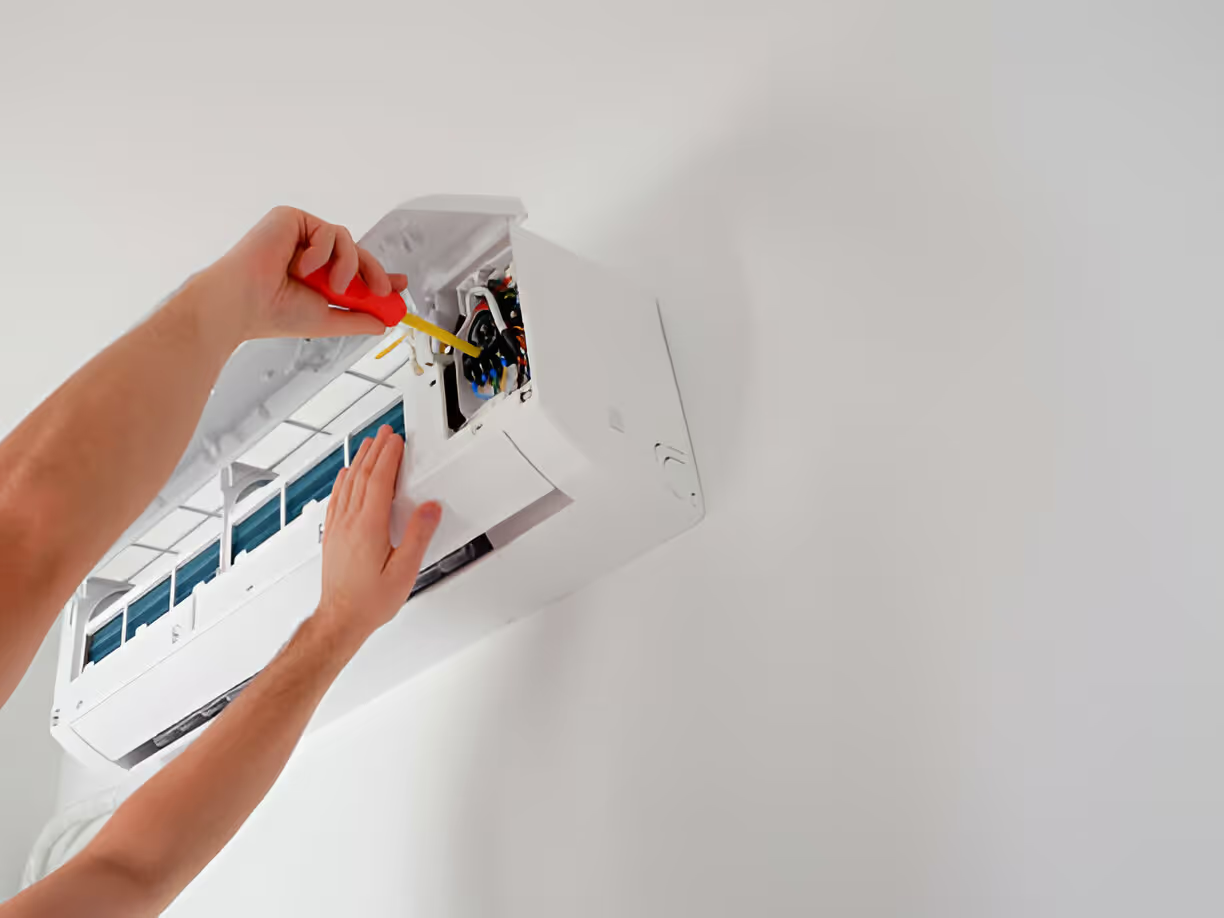Mini-Split Tune-Up in Plant City, FL


Why a mini-split tune-up matters in Plant City, FL
- Higher humidity increases condensate and mold risk inside drain pans and coils, causing odors and reduced cooling capacity.
- Long cooling seasons mean systems run more hours, accelerating wear on compressors, fans, and electrical components.
- Local pollen and agricultural dust can clog filters and indoor coils faster than in drier climates, reducing airflow and efficiency.
Timely tune-ups restore performance, extend equipment life, and help avoid mid-summer failures when cooling is needed most.
Common mini-split issues in Plant City homes
- Reduced cooling capacity or uneven room temperatures
- Frequent cycling or system short-cycling
- Water leaks from clogged condensate drains or overflowed pans
- Musty or moldy odors from dirty coils and drip pans
- High energy use compared with previous seasons
- Noisy operation from worn fans or loose mounting hardware
- Electrical faults or tripped breakers caused by poor connections or failing capacitors
Recognizing these symptoms early and addressing them during a tune-up prevents small problems from turning into costly repairs.
Standard Mini-Split Tune-Up Checklist
A comprehensive tune-up follows a systematic checklist to ensure safe, efficient operation:
- Filter inspection and replacement: Clean or replace washable or disposable filters to restore airflow and indoor air quality.
- Indoor coil cleaning: Remove dust and biological growth that reduce heat transfer and airflow.
- Outdoor coil and condenser cleaning: Clear debris, pollen, and agricultural dust that block airflow and raise operating pressures.
- Condensate drain inspection and cleaning: Clear blockages and flush lines to prevent overflow and water damage.
- Refrigerant level check: Verify refrigerant charge and look for signs of leaks. Low charge reduces cooling and damages compressors.
- Thermostat and control calibration: Ensure temperature sensors and control settings reflect room conditions for accurate operation.
- Electrical safety checks: Inspect wiring, terminal connections, capacitors, and contactors for wear, corrosion, or heat damage.
- Fan and motor inspection: Lubricate where applicable, tighten mounts, and check for squeaks or abnormal vibrations.
- Performance optimization: Measure suction/discharge pressures and temperatures, calculate superheat/subcooling where appropriate, and adjust settings for peak efficiency.
- System operation test: Run the unit through a full cycle to confirm consistent operation and verify that protections and controls function properly.
- Homeowner walkthrough and maintenance recommendations: Explain findings, necessary repairs, and simple upkeep steps to prolong performance.
Diagnostic and tune-up process
A typical diagnostic approach begins with a visual inspection, then moves to performance measurements and targeted cleaning or adjustments. Technicians assess both indoor and outdoor units, document system operating points, and prioritize any required repairs. In Plant City, extra attention is paid to condensate systems and coil hygiene because of humidity and local dust.
Expected duration and cost factors
- Duration: A standard residential mini-split tune-up typically takes between 45 minutes and 2 hours per system depending on the number of indoor heads, accessibility, and system condition. Multi-head systems require more time.
- Cost factors to expect: Price varies based on system size, number of indoor units, extent of cleaning required, access complexity, and whether refrigerant recharge or parts replacement is necessary. Seasonal demand and availability of technicians can also influence timing and service windows.
Instead of a flat price, expect a professional evaluation that identifies specific needs and any repair items. Understanding the components that drive cost helps homeowners prioritize maintenance and repairs.
Best timing and seasonal recommendations for Plant City
- Schedule tune-ups in late spring before the heat of summer to ensure the system handles peak cooling load efficiently.
- A second check in early fall can help with post-summer cleanup and prepare equipment for milder months.
- If your home faces heavy pollen exposure or ongoing construction/agricultural activity nearby, more frequent filter checks (monthly during high-pollen periods) are recommended.
Seasonal tune-ups reduce the likelihood of breakdowns during the hottest weeks and can capture problems early when repairs are generally less expensive.
Benefits of regular mini-split tune-ups
- Improved energy efficiency: Clean coils and correct refrigerant levels lower operating costs.
- Reduced breakdown risk: Electric and mechanical wear points are inspected and corrected before failure.
- Extended equipment life: Consistent maintenance preserves the compressor, motors, and electronics.
- Better indoor air quality: Clean filters and coils reduce dust, pollen, and microbial growth.
- Stable comfort: Systems maintain target temperatures and humidity control more reliably.
These outcomes are particularly valuable in Plant City where cooling reliability and humidity control directly affect comfort and indoor air quality.
How booking and appointment logistics typically work
When scheduling a tune-up, you will usually provide basic system details and availability. Technicians will request access to all indoor units and the outdoor condenser, and may ask for the system model and age to prepare parts and diagnostic tools. On the day of service, expect a safety check upon arrival, a walk-through of symptoms you’ve noticed, and a final report detailing work performed and any recommended repairs or future maintenance intervals.
Preparing your home: clear around indoor heads and the outdoor unit, ensure power access, and note any recent performance issues. This streamlines the visit and helps technicians complete the tune-up efficiently.
Maintenance tips between professional tune-ups
- Check and clean or replace filters every 1–3 months during heavy use.
- Keep outdoor condensers free from vegetation and debris; maintain several feet of clearance.
- Watch for water stains or pooling near indoor units and address drain clogs early.
- Keep indoor unit drains and visible ducts unobstructed and clean.
Regular homeowner care between professional visits preserves efficiency and reduces service needs.
A timely, thorough Mini-Split Tune-Up in Plant City, FL protects comfort and investment by addressing humidity-driven condensate issues, pollen-clogged filters, and the heavy cooling demands of the region. Understanding the tune-up checklist, the local factors that affect system health, and what to expect during a visit helps homeowners make informed decisions about maintenance and performance optimization.
Service Areas


